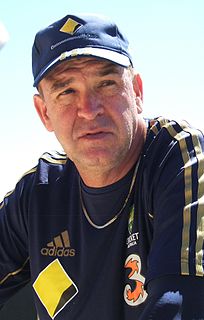A Quote by Tony Kushner
In a sense, I feel like the job of the artist at all times is essentially the same, which is simply to tell the truth. I mean, I'm nervous about any prescriptions for what a writer should or shouldn't do.
Related Quotes
But we should ask the question: Why should a writer be more than a writer? Why should a writer be a guru? Why are we supposed to be psychiatrists? Isn't it enough to write and tell the truth? It's not like telling the truth is common. Writers are the earthworms of society. We aerate the soil. That's enough.
The truth about being a writer is you do not choose the stories you tell, but stories choose you. You do not choose, therefore, characters either. Novels are like dreams you dream with your eyes open; they are books which appear in your head with the same apparent immediateness as they appear in your dreams at night. A writer always writes their obsessions and the truth is that all throughout life we end up writing the same thing in different ways.
It's very difficult to measure the impact on policy of any investigative journalism. You hope it matters to let a little more truth loose in the world, but you can't always be sure it does. You do it because there's a story to be told. I can tell you that the job of trying to tell the truth about people whose job it is to hide the truth is about as complicated and difficult as trying to hide it in the first place.
I feel my job as an artist is to drive people to country radio. That's my job as a country artist. So these streaming places, especially these on-demand streaming places, where you can just push a button and hear it as many times as you want, like YouTube, any of that stuff, that's taking all the ears away from country radio.
The war between the artist and writer and government or orthodoxy is one of the tragedies of humankind. One chief enemy is stupidity and failure to understand anything about the creative mind. For a bureaucratic politician to presume to tell any artist or writer how to get his mind functioning is the ultimate in asininity.
I like to have fun at work. It's okay if I don't. I've had that a few times. But generally, I'm someone who has a lot of fun at work, because I like my job. I think it's a fantastic job, at least that part of it is a fantastic job. And I like to have fun, and I personally feel that whether you're talking about the cast or the crew or the director or any combination thereof, that when people feel involved and comfortable and they feel like their work is being supported, that's the best environment to do good work.
To write with taste, in the highest sense, is to write [...] so that no one commits suicide, no one despairs; to write [...] so that people understand, sympathize, see the universality of pain, and feel strengthened, if not directly encouraged to live on. If there is good to be said, the writer should say it. If there is bad to be said, he should say it in a way that reflects the truth that, though we see the evil, we choose to continue among the living. The true artist [...] gets his sense of worth and honor from his conviction that art is powerful--
The very dull truth is that writing love scenes is the same as writing other scenes - your job is to be fully engaged in the character's experience. What does this mean to them? How are they changed by it, or not? I remember being a little nervous, as I am when writing any high-stakes, intense scene (death, sex, grief, joy).
To Jacob the act of critiquing art was essentially imprecise. That's why he didn't read reviews on anything he liked, be it a book, a movie, or a record. He believed that any work an artist puts forth which contains the truth as he or she sees it is worthy of consideration, and any commentary of the work beyond that is nothing more than pure individual opinion and should not be considered relevant to the work itself.
And, because my role in society - or any artist or poet's role - is to try to express what we all feel. Not to tell people how to feel, not as a preacher, not as a leader, but as a reflection of us all. And it's like that's the job of the artist in society, not to...they're not some alienated being living on the outskirts of town. It's fine to live on the outskirts of town, but artists must reflect what we all are. … If that's taken it too much on meself, I feel that artists are that - they're reflections of society... Mirrors.







































